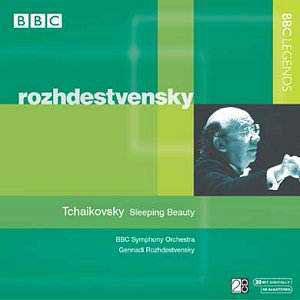I have been rather surprised that Gennadi Rozhdestvensky
has not featured more prominently in the highly successful BBC Legends
series. After all, he was the charismatic Chief Conductor of the BBC
Symphony Orchestra, albeit for an all-too-brief period (1978-1982),
and subsequent to that he has appeared quite often as a guest conductor.
However, this issue makes handsome amends and I hope it will be followed
by more of his recordings.
In the early 1980s the BBC issued on LP a complete
recording of this ballet by Rozhdestvensky and his orchestra (a recording
which I don’t believe has ever been issued on CD). This is not that
recording. What we have here instead is the live performance which was
given immediately prior to the studio sessions. For this performance
at least it seems that Rozhdestvensky made a few small cuts in the score.
However, only a few repeats were thus excised; no movements were entirely
omitted and I doubt anyone will complain. The cuts explain why this
version of the score is billed as a "Special concert edition."
As is usual with these BBC Legends recordings, the
notes tell us something of the circumstances of the performance. In
this case, the start of the concert was delayed for a full 45 minutes
because the unfortunate bass trombone player had been held up in London’s
traffic congestion and the conductor refused to begin without him. Since
the music itself lasts for over two and a half hours, without allowance
for intervals, the concert cannot have finished before 11 pm. However,
I suspect that the audience probably didn’t mind too much as the performance,
when it eventually began, was of high quality.
Prior to joining the BBC Rozhdestvensky had been for
nearly 20 years on the conducting staff of the Bolshoi Theatre in Moscow,
rising to the status of Principal Conductor (1965-1970). Indeed, it
was with Sleeping Beauty that he made his debut in that theatre,
in 1951, at the age of just twenty. It seems to me that this present
performance benefits hugely both from his deep knowledge of the score
in question and from his long theatrical experience. In Rozhdestvensky’s
hands the score unfolds dramatically, the pacing is adroit and convincing,
and rhythms are deft and supple. He conjures from his BBC orchestra
playing which appropriately mixes passion, delicacy and verve. To be
sure, there are a few fluffs and on occasion the ensemble is not quite
unanimous but such blemishes are rare and do not detract from the overall
success of the performance which has great sweep and commitment. I guess
the BBC players enjoyed and relished what must have been for them a
rare opportunity to play such a score in full; certainly, it sounds
as if they did.
In short, though this is a concert rendition and one
given by a symphony orchestra rather than by a theatre orchestra, there
is a whiff of greasepaint about the proceedings and I found myself caught
up in the performance and carried along by it. All the well-known highlights
such as the Waltz (No. 6) and Scene (No. 7) in Act 1 and the Panorama
(No. 17) in Act 2 come off very well. However, much of the value in
this release lies in the fact that we get the chance to hear many other
winning items, often very brief, which are only usually heard in the
theatre.
My enjoyment would have been still greater if a synopsis
had been provided. Really, such information is vital for anyone other
than balletomanes who know the ballet well. (It is just as important
as is the provision of texts and translations for vocal items, something
which BBC Legends consistently fail to provide, to their shame.) I must
say that for such a prestigious series the documentation still leaves
something to be desired. I do also regret that the (excellent) leader
and principal cellist, who both contribute important solos, are not
credited – but, then, this might be unfair to the excellent and hard-working
wind principals.
The recorded sound is typical BBC sound of that vintage,
which is to say very good, despite the dry Festival Hall acoustics.
The BBC engineers balanced the orchestra very well and on my equipment
there was ample detail as well as a convincing overall sound image of
the full orchestra. There are some coughs and wheezes from the audience
but these do not constitute a significant distraction.
These well-filled CDs contain a stylish, ebullient
and exhilarating performance of a great ballet score. They also constitute
an excellent souvenir of Rozhdestvensky’s work with the BBCSO. I enjoyed
this vivid and idiomatic performance very much and can recommend it
confidently.
John Quinn


